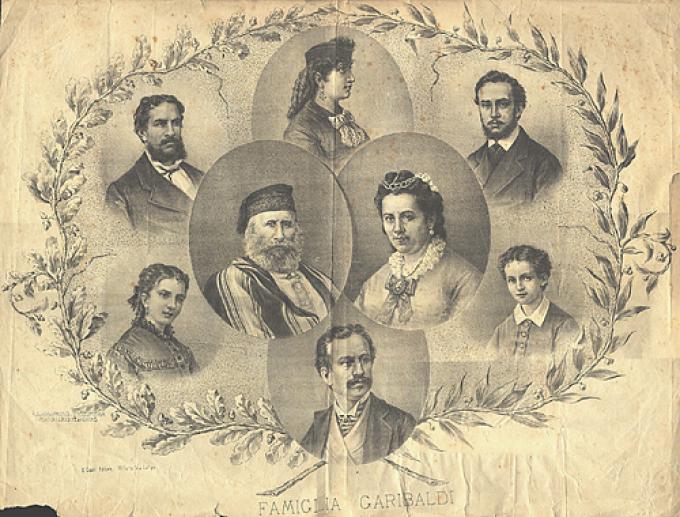Giuseppe Garibaldi and his Family Tree
Giuseppe Garibaldi, revered as one of the founders of the modern Italian state, was born in Nice (Nizza) more than 200 years ago on July 4, 1807. Second of five children, he had three brothers who became either sailors or merchants and one sister, Maria Elisabetta died at a young age.
Angelo, the elder brother, sailor then merchant in New York, ended his career as consul of Piedmont - Sardinia in Philadelphia. Michele became a navy captain, got married but did not have any children. Felice bought an olive oil factory in Bitonto (province of Bari) in 1851; he was able to scale up production and export his Pugliese olive oil throughout Europe.
None of Giuseppe’s siblings lived a long life.
The surname Garibaldi seems to have originated somewhere in Liguria and derives from the Longobardic first name Garibaldus, (from the Germanic Haribald) meaning “courageous man carrying a lance”. Spelling variations of this last name are: Garibaldo, Garibaldi, Gariboldo and many more. It is the Graveglia Valley located in the province of Genova that is believed to have been the birthplace of the Garibaldi Family. Hamlets are still populated with families carrying the last name Garibaldi today.

Giuseppe’s oldest Ancestor was Angelo Maria Garibaldo son of Domenico Garibaldi and Giulia Riceto born in the hamlet of Chiesanuova, part of the town of Ne (located in the province of Chiavari part of the Graveglia Valley) on January 9, 1741. Giuseppe’s father, Domenico born in 1766 in the province of Chiavari settled with his family in Nice when he was 10 years old. In 1794 he married Rosa Raimondo, originally from Loano (province of Savona). Domenico listed himself as merchant in Giuseppe’s birth certificate although he would have wanted his son to become a lawyer or a doctor, while his mother, a fervent Christian, would have wished him to become a priest instead.
Domenico and Rosa had been able to acquire enough wealth to give their children a good education; only for Giuseppe they recruited three private tutors, two priests and a layman.
Giuseppe Garibaldi did not follow his mother’s wishes to join the Church and became a sailor, a merchant captain and an officer in the Piedmont-Sardinia Navy. In 1835 he fled to France after participating in an unsuccessful mutiny (the mutiny of Genova) fomented in part to spark a republican revolution in Piedmont-Sardinia. By 1836 Garibaldi was living in South America, where he gained fame as a revolutionary mercenary fighting in Brazil and Uruguay.
In 1848 Garibaldi returned to Italy with his band of "redshirts." Together they joined the Risorgimento a movement to unify the disparate Italian states by wresting Italian territory from foreign powers. A powerful defense of Rome against the French army in 1849 and an heroic escape from Austrian forces further increased Garibaldi’s fame, but he found himself in exile again in Tangeri, New York and Peru after his republican sympathies did not endear him to the monarch of the Italian states. Garibaldi returned to Italy in 1854 entering the service of Piedmont-Sardinia and a few years later he defeated the Austrians driving them out of Northern Italy. In 1860 he gathered about a thousand volunteers (called “I Mille”) in two ships and landed in Sicily where he was able to defeat the Bourbon-French army and capture both Naples and Sicily in hope of uniting the entire country under the king of Piedmont-Sardinia, Victor Emmanuel II. Thus the kingdom of Italy was proclaimed in 1861.Garibaldi’s continued popularity and success as a military commander inspired Victor Emmanuel II to turn to him for assistance. He headed two private expeditions against papal Rome and led an Italian army against the Austrians to acquire Venice as part of the Italian Kingdom. After 1871 Garibaldi, crippled by rheumatisms and old injuries retired. He died on June 2, 1882 at the age of 75 in the island of Caprera.
Garibaldi married three times and had several children although most of them died at a young age.
His first wife Anita Garibaldi (originally Ana Maria de Jesus Ribeiro da Silva from Brasil) gave him four children:
Domenico Menotti Garibaldi
Ricciotti Garibaldi
Rosa Garibaldi also known as Rosita
Teresa Garibaldi
He did not have any children from his second wife, Giuseppina Raimondi whom he married 11 years after the death of Anita, because he left her soon after marrying her. The marriage was later annulled.
He had an illegitimate child with Battistina Ravello:
Anita Garibaldi
He married a third time fo Francesca Armosino (in the picture) and had three children:
Clelia Garibaldi
Rosita
Manlio Garibaldi
To this day, his children’s descendents keep his legacy alive.
